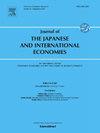Labor market outcomes for doctoral graduates in Japan: Evidence from a large statistical survey
IF 3.1
3区 经济学
Q1 ECONOMICS
Journal of the Japanese and International Economies
Pub Date : 2025-08-30
DOI:10.1016/j.jjie.2025.101389
引用次数: 0
Abstract
Amid growing concerns about Japan’s declining research capability, policies to support doctoral human resources are actively discussed and implemented. This study uses micro data from the 2022 Employment Status Survey to document the labor market outcomes of postgraduates, distinguishing doctoral and master’s graduates. According to the analysis, first, the employment rate of doctoral graduates is higher than that of master’s graduates, with the difference particularly pronounced among females. Second, on average, doctoral graduates are paid 40% more than master’s graduates, and the proportion of low-wage workers is smaller among doctoral graduates compared to those with a master’s or four-year university education. Third, when controlling for detailed industries and occupations, the wage difference between doctoral and master’s graduates reduces to about 10%, suggesting that doctoral graduates tend to self-select into higher-paying jobs. Fourth, the discounted present value of lifetime earnings is estimated to be 17% higher for male and 36% higher for female doctoral graduates compared to master’s graduates. Based on some assumptions, the internal rate of return on investment in doctoral education is estimated at around 10% for both males and females.
日本博士毕业生的劳动力市场结果:来自大型统计调查的证据
在对日本研究能力下降的担忧日益加剧的情况下,积极讨论和实施支持博士人力资源的政策。本研究使用《2022年就业状况调查》的微观数据来记录研究生的劳动力市场结果,区分博士和硕士毕业生。分析表明,首先,博士毕业生的就业率高于硕士毕业生,其中女性的差异尤为明显。其次,博士毕业生的平均薪酬比硕士毕业生高出40%,并且博士毕业生中低收入工人的比例低于硕士或四年制大学毕业生。第三,在控制具体行业和职业的情况下,博士和硕士毕业生的工资差距缩小到10%左右,这表明博士毕业生倾向于自我选择高薪工作。第四,与硕士毕业生相比,男性博士毕业生的终身收入贴现现值估计高出17%,女性博士毕业生高出36%。根据一些假设,博士教育的内部投资回报率估计在10%左右,男女都是如此。
本文章由计算机程序翻译,如有差异,请以英文原文为准。
求助全文
约1分钟内获得全文
求助全文
来源期刊
CiteScore
5.10
自引率
6.90%
发文量
36
期刊介绍:
The Journal of the Japanese and International Economies publishes original reports of research devoted to academic analyses of the Japanese economy and its interdependence on other national economies. The Journal also features articles that present related theoretical, empirical, and comparative analyses with their policy implications. Book reviews are also published.

 求助内容:
求助内容: 应助结果提醒方式:
应助结果提醒方式:


